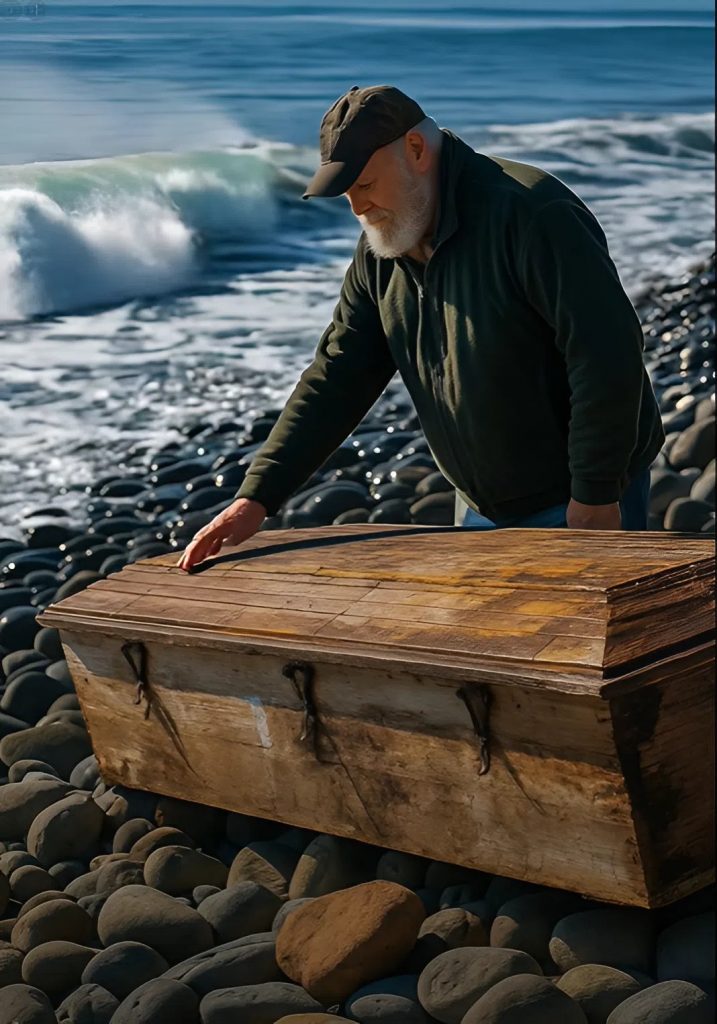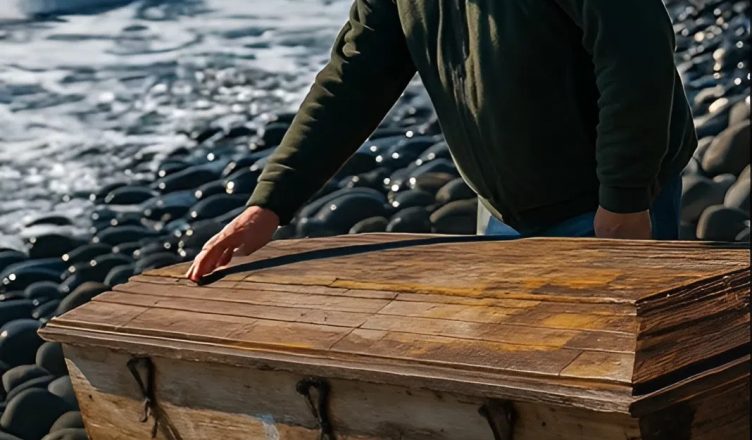It was still dark when the old fisherman woke up. The air smelled of salt and rain, the wind carried a damp chill from the sea, and the slow rhythm of the waves whispered promises of a good catch. He gathered his nets, checked his small boat, and made his way toward the rocky beach.
But that morning was different.
Between the stones, something strange caught his eye — a large, metallic shape half-buried in wet sand. At first, he thought it was a shipping container or a barrel thrown ashore by a storm. But as he walked closer, his steps slowed. The shape was too narrow… too human.
It wasn’t a barrel.
It was a coffin.
A heavy, rust-covered metal coffin, tangled with seaweed and barnacles, glistening faintly under the gray dawn light. It looked ancient — as if it had been lying beneath the sea for decades before the waves decided to return it.
The fisherman stood motionless, his heart pounding. The beach was empty, silent except for the steady crash of waves.
“Dear God…” he whispered, glancing around.

For a long moment, he didn’t dare to move closer. But curiosity — that dangerous, human curiosity — won. He stepped toward the coffin. A small, corroded lock dangled from its latch. One firm pull, and it crumbled away in his hand.
His hands trembled as he lifted the lid.
Inside lay a man.
Not a skeleton, not a decayed corpse — but a body perfectly preserved, as if asleep. His skin was pale and smooth, his lips pressed tightly together, his hair slicked neatly back. He wore an old naval uniform, dark blue with faded golden buttons. And then the fisherman noticed — the man’s eyes were open.
Gray, cold, unblinking… staring straight at him.
The fisherman stumbled backward, his breath catching in his throat. The air around him seemed to thicken; the sea went eerily still. Even the wind stopped. For a second, it felt as if the whole world was holding its breath.
Then he saw it — a small metal plaque resting on the man’s chest. The letters were nearly erased by time. He picked it up, and a wave of freezing pain ran through his arm.
The inscription read:
“Do not disturb the sleep of the sea.”
Before he could process it, a deep rumble echoed from the water. The waves churned violently; bubbles burst on the surface as if the ocean itself had begun to boil. The coffin shuddered — and then the body moved.
The man’s lips parted slightly, and a thin stream of seawater trickled out.
The fisherman screamed and ran, stumbling across the rocks until he reached the first house in the village. Pale and shaking, he could barely speak.
“He… he opened his eyes… he looked at me!” he gasped.
When the police arrived an hour later, the beach was empty. No coffin. No footprints. Nothing but disturbed sand — long drag marks leading down into the sea.
They said he was exhausted, that he had imagined it. But three days later, another metal coffin washed ashore in a neighboring town. This time, no one dared to open it. They buried it right there, in the sand, and walked away without looking back.
A week later, the fisherman was found unconscious in his boat. On his chest lay the same metal plaque with the same inscription:
“Do not disturb the sleep of the sea.”
When he finally woke up, his eyes were empty, distant. He spoke only one sentence:
“They’re coming back… the sea doesn’t sleep anymore…”
Since that day, no one in that coastal village dares to sail before sunrise. Locals say that on moonless nights, if you listen carefully, you can hear faint metallic knocks from beneath the waves — as if something down there is trying to open its coffin again.
And sometimes, when the fog rolls in thick and white, fishermen swear they see a figure walking in the shallow water — a man in an old naval uniform, searching for the one who disturbed the eternal silence of the sea.
